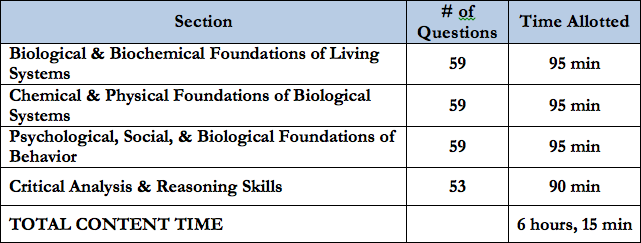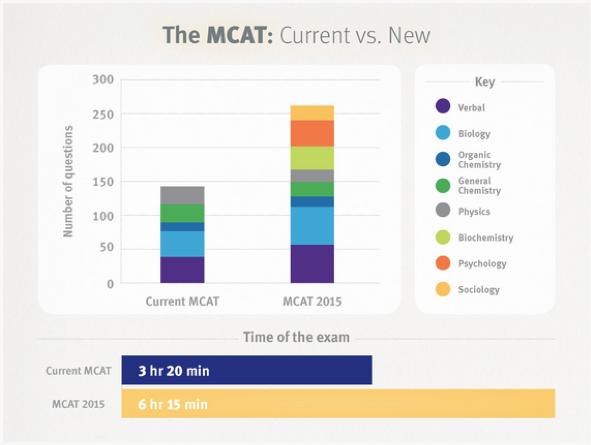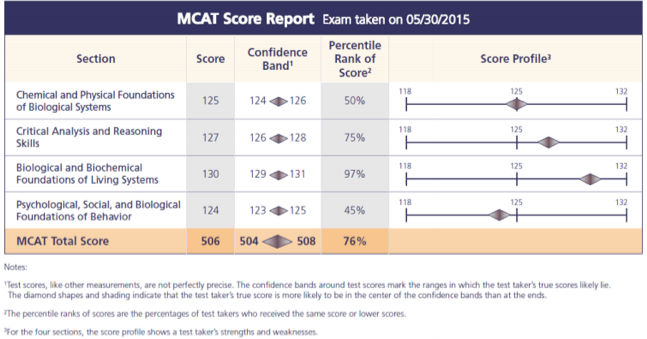The Association of American Medical Colleges, or AAMC, will officially launch a new version of the MCAT, called the MCAT2015, next spring, with the first exam scheduled for April 17th, 2015. The test has been changed for the first time since 1991, and AAMC is calling it “a better test for tomorrow’s doctors.” It was designed “to help better prepare tomorrow’s doctors for the rapidly advancing and transforming health care system.”
New Structure of the MCAT2015
The MCAT2015 is changing in a major way. Most notably, it’s going to almost double in length. The MCAT2015 will include 230 questions over 6 hours and 15 minutes versus the current 144 questions in 3 hours and 20 minute. Because of this, the new test will require a lot more stamina and focus of its test takers.
The MCAT2015 will also include different types of questions. The first three sections are organized around “big ideas” in the sciences. According to the AAMC, these sections “reflect current research about the most effective ways for students to learn and use science, emphasizing deep knowledge of the most important scientific concepts over knowledge simply of many discrete facts.”
Here is a sample question from the MCAT2015 from the section, “Chemical & Physical Foundations of Biological Systems.” It focuses on reasoning about scientific theories and models.
The radius of the aorta is about 1.0 cm and blood passes through it at a velocity of 30 cm/s. A typical capillary has a radius of about 4 10-4 cm with blood passing through at a velocity of 5 10-2 cm/s. Using this data, what is approximate number of capillaries in a human body?
A. 1 104
B. 2 107
C. 4 109
D. 7 1012
The new sections will also test additional skills, including research design, graphical analysis and data interpretation. Kaplan claims that the “passages will be restructured to test all of the natural sciences within biological systems,” giving the test a more medical focus by showing the application of the sciences to medicine.
The following visual, from Kaplan Test Prep, illustrates the structural and content changes between the two tests.
The US News blog, “Medical School Admissions Doctor,” is estimating that the vast amount of information covered on the MCAT2015 requires “a year of biology, a semester of biochemistry, a year of chemistry, a year of physics, a year of organic chemistry, a semester of psychology, a semester of sociology, and a recommended year of humanities – several requirements above the standard medical school prerequisites.”
Score Scale
Each of the four sections will be scored individually, from a low of 118 to a high of 132, with a midpoint of 125. Scores are combined to create a total score ranging from 472 to 528, with a midpoint of 500. The new score reports will provide details on your test performance. “The AAMC envisions a score report that will bring together MCAT scores, percentile ranks, confidence bands, and score profiles in a way that highlights applicants’ strengths and weaknesses.” The MCAT Score Report Prototype released by the AAMC illustrates each of these aspects of scoring on a sample score report.
Percentile ranks are included so examinees can compare their performance to others who took the new exam. Confidence bands show the ranges of scores an examinee could expect on another MCAT attempt. Score profiles provide information about applicants’ strengths and weaknesses across the four sections of the exam.
Should You Take the Old, or Wait for the New?
Some students are wondering if they should hurry to take the MCAT before the change. “The Medical School Admissions Doctor” reminds potential applicants that the current MCAT still requires a solid college-level background. The blog recommends that students who “can get two semesters each of biology, chemistry, physics, and organic chemistry all done before January 2015” might benefit from taking the current MCAT before it is removed from testing options after January.
Just because the MCAT2015 will propose new challenges, doesn’t mean you should rush to take the current exam before you’re ready. Bonnie Miller, senior dean associate for health sciences at Vanderbilt University advises her students to wait before taking the MCAT. “Honestly, I think you’re better off taking an exam that you’ve had a while to prepare for,” she says. Since most medical schools accept scores from two to three years ago, many students will be able to keep their options open when it comes to choosing what scores to use.
No matter which test you take or when, be prepared! And if you have any questions, contact Collegiate Gateway – we’re always happy to help.



